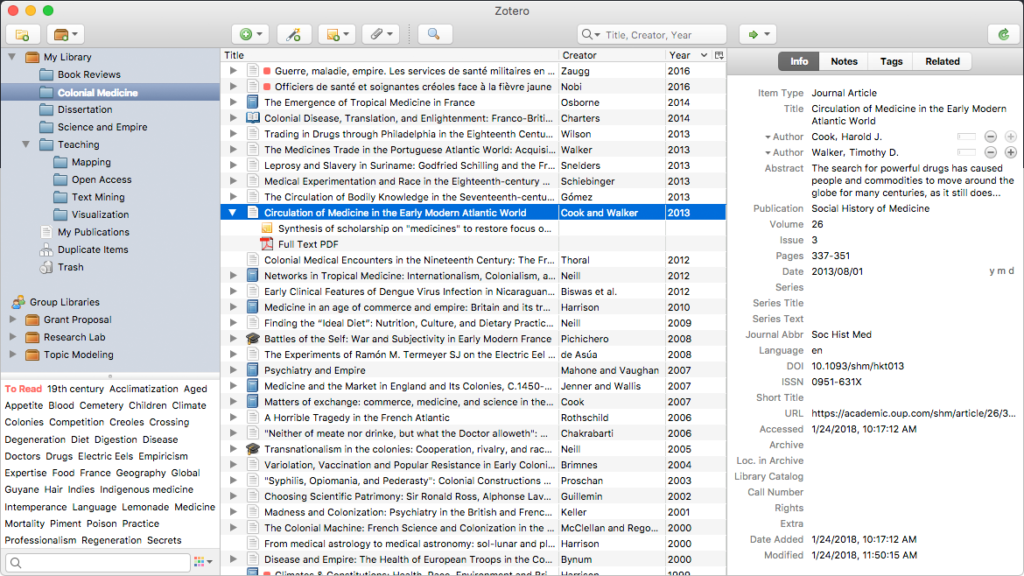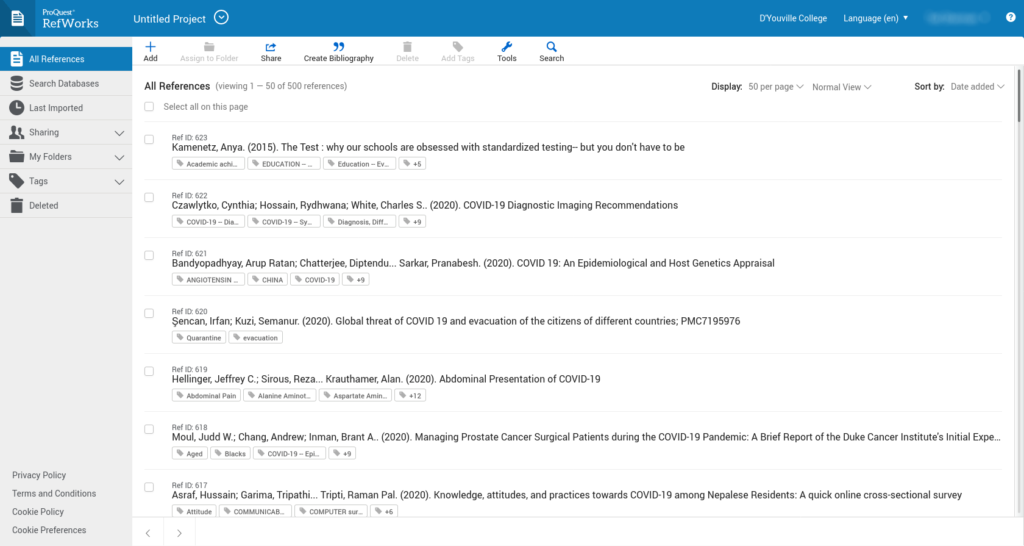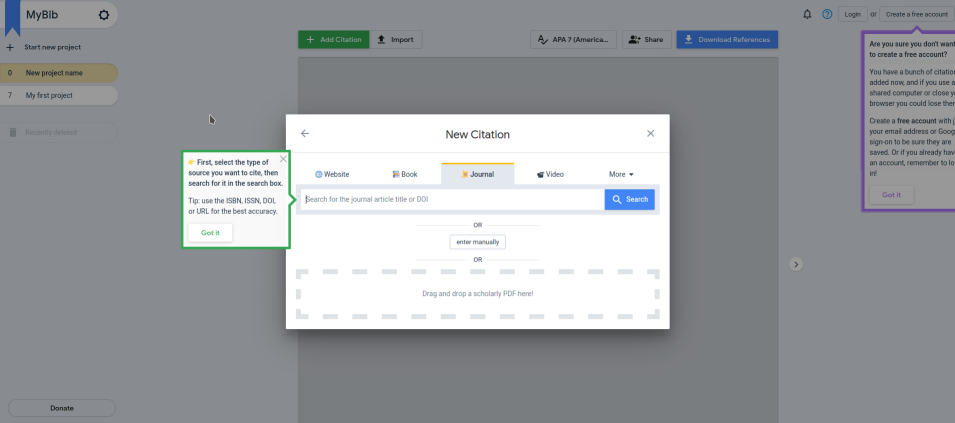
Do you hate searching for articles and citation information that you had saved on your computer?
Sometimes it is hard to find good articles for your research assignments. Having to find it a second time because you can’t remember where you saved it is just frustrating.
Don’t get frustrated, get organized! Use citation management software to tame those large research projects.
You can use this software (aka “Reference Management Software”) to collect, organize, store and retrieve publication information. Create works cited pages and in-text citations in a wide variety of styles such as APA, MLA and more from this data.
Researchers working on large research papers or on multiple projects will benefit the most from these services. At their most basic, they work similar to browser bookmarks. They allow users to save and organize interesting materials.
They offer a wide range of options in addition to saving citation information though, so it takes some time to learn how to use them effectively.
These services have many features that take time to learn and are not ideal for smaller projects with few citations.
Citation Management Features
There are several different citation management solutions, each with their own unique features. Students selecting a citation manager, whether fee based or free, might want to look for options that do the following:
-Organize citations
-Bookmark citations while you search
-Search databases from within citation manager
-Include cloud based storage
-Allow collaboration with team
-Include editable styles
Best Free Citation Managers
While there are several citation managers available, we have selected a short list of the best free software (or in the case of Refworks, free for D’Youville students). We selected software based on intuitiveness, helpful features and reliability. The following are in random order. The following selections are in random order.

Zotero
This robust software gives you plenty of features for managing information and creating works cited pages. They continue to add new features, so keep checking back if Zotero doesn’t currently meet your needs.
The Zotero software can be installed on Mac, Windows and Linux operating systems. It is also available as an online service with 330 MB of free storage. The desktop version syncs with the online service so your library is up to date, no matter how you enter your information.
Zotero includes the major academic citation styles by default, but it has a free repository with over 10,000 styles available.
The software has a number of options for building your citation library. The Zotero browser extension adds a button that collects information from web pages with a click. It is available for most major web browsers including Chrome, Safari and Edge.
You can directly export information from most of the library databases. Save the file in RIS format and import your citations into Zotero.
Organize and sort your information by placing in folders or assigning tags.
Zotero extensions for in-text citations are available for various word processors including Word and Google Docs.
The Zotero Groups feature allows you to share libraries and build bibliographies with others.
Zotero special features include:
-Barcode Scanner – input information from books by scanning the barcode
-Citation Counter – finds the number of times an article has been cited
-OCR – performs automatic text recognition on PDFs in your library
-Data Analysis
Zotero is a great option for those working on large projects and want lots of options. It has a robust set of features that match the most popular fee based services. These options come at a price however. It might take a little longer to learn how to use this software and the documentation can be unclear. It is worth trying though and the price can’t be beat.

Refworks
Refworks, while not technically free, is free for D’Youville students courtesy of the library. It has many great features, so we have included it in this list. The one drawback is that you lose access when you graduate, but you can easily export your citations to other options on this list.
The software is cloud based and works on any operating system with Internet access. Installation is not required to use this service. Some add-on tools are available for your browser and word processor.
Refworks includes 100MB of storage. Save PDF documents alongside the citation information and highlight from within the interface.
Over 6,000 citation styles are available. It includes all major academic styles and several thousand journal specific styles.
The Refworks tool page includes a browser extension that makes it easy to gather information from library database searches. Most of our databases have a citation export feature that sends citations directly to your Refworks account.
You can organize your collection with folders and tags. The interface allows you to select items and drag to folders for easy categorization. It includes a tool to search your collection or grab information from an external database.
The Refworks tool page includes an In-Text Citation extension for Word and Google Docs. The extension allows you to select citations from within the word processor. It will create and in-text citation in the selected style and generate a works cited age based on the citations you include in your paper.
Share folder with a team via email invitation. All team members must have a Refworks account to use this feature though. Assign team members various levels of permision such as viewing, adding or editing citation information.
Refworks is an excellent citation management tool. It has an active development team that tests, modifies and adds new features constantly. The main drawback to this software is that you will lose access upon graduatation. Use the export feature to transfer your data to other options on this list.

Mendeley
Mendeley software installs on Windows, Mac and Linux operating systems. Your Mendeley library is also online. The online library automatically syncs with your desktop software.
Mendeley is a freemium product with most of its functionality free. It includes 2 GB of storage which can be increased by paying for a premium plan.
Create citations with Microsoft Word. Download the Mendeley citation add-in from the Office Store. It can be added from the insert tab in Word. This does not work with the online version of Word available for D’Youville however.
The add-in accesses your Mendeley library allowing you to select information for in-text citations. Bibliographies are created from in-text citations.
Building your Mendeley library is easy. The browser plugin can capture information from web pages. You can also export information from the library databases. Save these files in RIS or Bibtex format and import them into your collection. Mendeley includes a search box that gives you the option to add to your library from the search results. It is an acadmic focused database with information from many different disciplines.
Organize your information by placing them in folders or assigning tags.
Create private groups to share citations and PDFs. Groups can contain up to 25 people.
The Mendeley software is easy to use and is great for finding and organizing information. Creating citations and works cited pages may be a little challenging for those used to using some of the other citation managers. Those that use Word as their primary word processor may want to try this service. It has an easy to use interface that allows you to store your information right on computer instead of in the cloud.

MyBib
Unlike the other options on this list, MyBib has no citation management functionality. It does not store or organize citation information for you. It does have a simple to use interface that allows you to create works cited pages without having to sign up for an account.
This web based service includes many text cues to show you how to enter your information and create a bibliography. It includes over 9,000 citation styles. Each citation in your bibliography will include a link that opens a pop up window containing the in-text citation information. This is not ideal for citation styles that are arranged numerically.
Enter information manually or by using shortcuts for the most common publication types. These include DOI searches for journals, ISBN searches for books and text recogntion for some academic PDF files
You can also import Bibtex files to populate your bibligraphy. Most of the databases in the D’Youville Library collection allow you to export citation information in Bibtex format.
While MyBib does not manage citations, it can sort your works cited page. Sort citations by author, date or title.
Share your bibliographies with others via email invite. Team members can view and add citations.
MyBib is a great option for those that are working on small projects that just need to create a single works cited page. It cannot be used to store and save citations. It is very easy to use and is great for making short bibliographies
Conclusion
The citation managers above are the some of the best free options available. They each have helpful features for those working on academic research projects, either individually or in groups.
These were selected for their accessibility (easy to install or create an account), stability, usability and functionality in comparison to other similar free software.
You may want to consider some of the subscription based services not listed here. Some are inexpensive and offer additional functionality. The D’Youville Library is happy to help you select and use the citation management system that best suits your needs.
